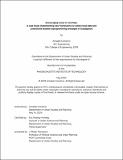Encouraging reuse in rural Italy: A case study implementing new frameworks to collect local data and understand feasible reprogramming strategies in Guadagnolo
Author(s)
Consilvio, Annabel
DownloadThesis PDF (56.96Mb)
Advisor
Robsky-Huntley, Eric
Terms of use
Metadata
Show full item recordAbstract
This thesis presents a new survey methodology for collecting data on occupancy, building typologies, and building conditions in small, depopulating towns in rural Italy. The survey methodology is split into two phases: one in which granular data is gathered through a series of visual surveys and a second in which this data is analyzed through a series of assessments aimed at identifying the most strategic buildings for reuse to support economic development. With one in three Italian municipalities losing population since 1951, this new framework aims to equip municipalities with critical data that can inform strategic reprogramming efforts and strengthen funding applications (Serico Gruppo Cresme, 2008). The research is built on the prior efforts and knowledge of Liminal, the thesis client and an organization in Italy working to build capacity within these rural communities. By providing tools like this framework, Liminal empowers residents to envision new futures and supports municipalities to realize these visions.
This approach was tested in Guadagnolo, a rapidly depopulating town in the Monti Prenestini region of Lazio, which witnessed a 50% population decline in just two decades (Progetto - Campo Base Guadagnolo, 2022). Through this methodology, a robust and granular spatial database model of Guadagnolo’s built fabric was constructed, permitting analysis of possible sites of reuse to support a university satellite campus and develop a long-term tourism destination. The assessment methodology provided several key buildings for the town to consider adapting to support these two reuse scenarios, while also generating extensive data that the town can utilize in a variety of future initiatives and funding applications. Ultimately, this thesis endeavors to support rural Italian communities by providing a data-driven framework that can unlock funding opportunities and initiate strategic planning efforts, providing a path forward that protects the cultural and ecological richness of these small towns.
Keywords: rural development, strategic reuse, economic revitalization, survey methodology
Date issued
2024-05Department
Massachusetts Institute of Technology. Department of Urban Studies and PlanningPublisher
Massachusetts Institute of Technology